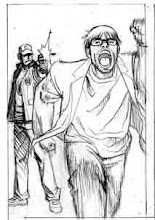Icarus/Daedalus
This tale of indulgent parenthood illustrates the antique idea that when the roles of life are assumed by the improperly initiated, chaos supervenes. The son against the father for the mastery of the universe, and the daughter against the mother to be the mastered world.
The traditional idea of initiation combines and introduction of the candidate into the techniques, duties, and prerogatives of his vocation with a radical readjustment of his emotional relationship to the parental images.
The Mystagogue (father or father-substitute) is to entrust the symbols of office only to a son who has been effectually purged of all inappropriate infantile cathexes - for whom the just, impersonal exercise of the powers will not be rendered impossible by unconscious (or perhaps even conscious and rationalized) motives of self-aggrandizement, personal preference, or resentment. Ideally, the invested one has been divested of his mere humanity and is representative of an impersonal cosmic force. He is the twice-born: he has become himself the father. And he is competent, consequently, now to enact himself the role of the initiator, the guide, the sun door, through whom one may pass from the infantile illusions of "good" and "evil" to an experience of the majesty of cosmic law, purged of hope and fear, and at peace in the understanding of the revelation of being.
Circumcision, cutting off the part of the mother, revealing his male power.
Communion/blood drinking rituals.
Egypto-Babylonian & Trojan-Cretan " labyrinth complex", Aeneas & Gilgamesh, "journey of the soul to the underworld"
The paradox of creation, the coming of the forms of time out of eternity, is the germinal secret of the father. It can never be quite explained. Therefore, in every system of theology there is an umbilical point, an Achilles tendon which the finger of mother life has touched, and where the possibility of perfect knowledge has been impaired. The problem of the hero is to pierce himself (and therewith his world) precisely through that point; to shatter and annihilate that key know of his limited existence.
The problem of the hero going to meet the father is to open his soul beyond terror to such a degree that he will be ripe to understand how the sickening and insane tragedies of this vast and ruthless cosmos are completely validated in the majesty of Being. The hero transcends life with its peculiar blind spot and for a moment rises to a glimpse of the source. He beholds the face of the father, understands - and the two are atoned.
"Gird up thy loins now like a man; I will demand of thee, and declare thou unto me. Wilt thou also disannul my judgement? Wilt thou condemn me, that thou mayst be righteous? Hast thou an arm like God? Or canst thou thunder with a voice like him? Deck thyself now with majesty and excellency; and array thyself with glory and beauty. Cast abroad the rage of thy wrath: and behold every one that is proud and abase him. Look on every one that is proud, and bring him low; and tread down the wicked in their place. Hide them in the dust together; and bind their faces in secret. Then I will also confess unto thee that thine own hand can save thee."
God to Job
Man cannot measure the will of God, which derives from a center beyond the range of human categories. Categories are totally shattered to the last. Job was a hero who, by his courage in the fiery furnace, his unreadiness to break down and grovel before a popular conception of the character of the All Highest, had proven himself capable of facing a greater revelation than the one that satisfied his friends.
For the son who has grown really to know the father, the agonies of the ordeal are readily borne; the world is no longer a vale of tears but a bliss-yielding, perpetual manifestation of the Presence.

No comments:
Post a Comment